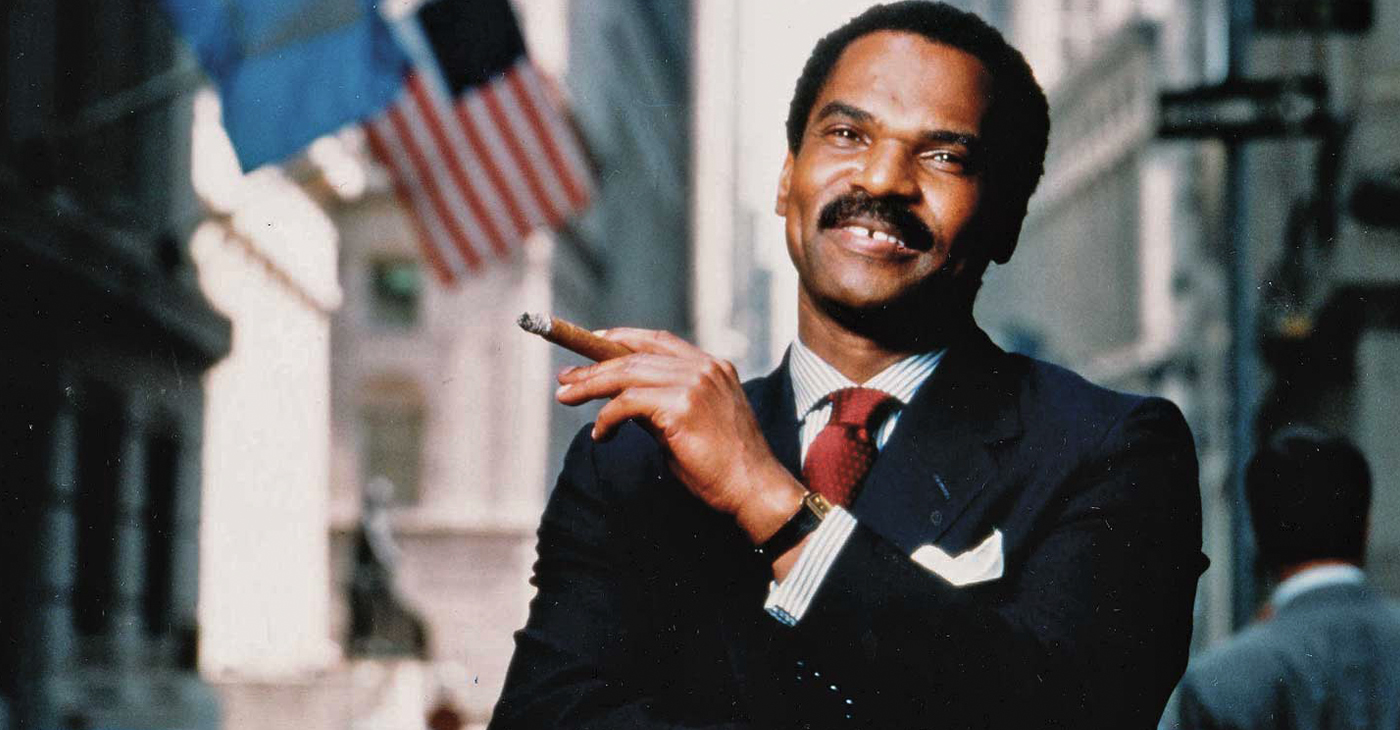Activism
Reginald F. Lewis: A Wall Street Titan
By 1983, Reginald F. Lewis’ dream was to “do the deals himself,” thereby establishing the venture capital firm TLC Group, LP. The firm purchased the failing McCall Pattern Company for a reported $22.5 million. After successfully reviving McCall, Lewis sold it for $90 million. He later outbid Citicorp and purchased TLC Beatrice International for $985 million. It was the largest offshore buyout in American history at the time.

By Tamara Shiloh
In 1965, a select group of Black students participated in a summer school program funded by the Rockefeller Foundation and held at Harvard Law School. Each student lobbied for acceptance in the program, which introduced them to legal studies. One student’s confidence and leadership skills made him stand out: Reginald F. Lewis (1942–1993).
Lewis made such an impression that Harvard Law welcomed him as a student that fall. This acceptance made him the only person in the law school’s 148-year history to be admitted before applying.
In 1968, Lewis began his career with the New York City firm Paul, Weiss, Rifkind, Wharton & Garrison LLP, where he practiced corporate law. He served as counsel to the New York–based Commission for Racial Justice and represented The Wilmington 10, a group of civil rights activists who had been unjustly convicted of an arson fire in 1971. He successfully forced North Carolina to pay interest on the Wilmington 10 bond. In 1970, after networking with colleagues, he opened Wall Street’s first African American law firm.
By 1983, Lewis’ dream was to “do the deals himself,” thereby establishing the venture capital firm TLC Group, LP. The firm purchased the failing McCall Pattern Company for a reported $22.5 million. After successfully reviving McCall, Lewis sold it for $90 million. He later outbid Citicorp and purchased TLC Beatrice International for $985 million. It was the largest offshore buyout in American history at the time.
Looking back, in 1960, Lewis told a friend, “I know that what I’d like is to be the richest Black man in America.” He was on his way. TLC became the first Black-owned company to pass the billion-dollar mark with its annual sales of $1.8 billion.
Lewis had strong influences in his life from childhood. Growing up in East Baltimore, his parents, grandparents, uncles, and aunts always encouraged him to “be the best that you can be.”
Young Reginald’s grandmother instilled in him the importance of saving, “even cutting and peeling strips from the bottom of a tin can and nailing it to the floor of a closet to protect his savings,” according to his website.
He set up a delivery route at age 10, selling the Afro American newspaper. What began with 10 customers grew to more than 100 over two years. Even then young Reginald had the business savvy to sell his route at a profit.
About Lewis, former-president Barack Obama commented: “[He] had the work ethic, the skills, and the know-how. Beyond that, he had the temperament, the self-assurance, and the confidence that he belonged there. Being the first of anything requires a certain mindset. Reginald Lewis had it.”
Lewis’ life was cut short by his untimely death after a short illness in January 1993. He was 50 years old.
Learn more about young Reginald Lewis and the challenges he overcame as he transformed himself from ordinary to extraordinary in Lin Hart’s “Reginald F. Lewis Before TLC Beatrice: The Young Man Before the Billion-Dollar Empire.”
Activism
Oakland Post: Week of April 24 – 30, 2024
The printed Weekly Edition of the Oakland Post: Week of April 24 – 30, 2024

To enlarge your view of this issue, use the slider, magnifying glass icon or full page icon in the lower right corner of the browser window. ![]()
Activism
Oakland Post: Week of April 17 – 23, 2024
The printed Weekly Edition of the Oakland Post: Week of April 17 – 23, 2024

To enlarge your view of this issue, use the slider, magnifying glass icon or full page icon in the lower right corner of the browser window. ![]()
Activism
Oakland Schools Honor Fred Korematsu Day of Civil Liberties
Every Jan. 30, OUSD commemorates the legacy of Fred Korematsu, an Oakland native, a Castlemont High School graduate, and a national symbol of resistance, resilience, and justice. His defiant stand against racial injustice and his unwavering commitment to civil rights continue to inspire the local community and the nation. Tuesday was “Fred Korematsu Day of Civil Liberties and the Constitution” in the state of California and a growing number of states across the country.

By Post Staff
Every Jan. 30, OUSD commemorates the legacy of Fred Korematsu, an Oakland native, a Castlemont High School graduate, and a national symbol of resistance, resilience, and justice.
His defiant stand against racial injustice and his unwavering commitment to civil rights continue to inspire the local community and the nation. Tuesday was “Fred Korematsu Day of Civil Liberties and the Constitution” in the state of California and a growing number of states across the country.
One OUSD school is named in his honor: Fred T. Korematsu Discovery Academy (KDA) elementary in East Oakland.
Several years ago, founding KDA Principal Charles Wilson, in a video interview with anti-hate organization “Not In Our Town,” said, “We chose the name Fred Korematsu because we really felt like the attributes that he showed in his work are things that the children need to learn … that common people can stand up and make differences in a large number of people’s lives.”
Fred Korematsu was born in Oakland on Jan. 30, 1919. His parents ran a floral nursery business, and his upbringing in Oakland shaped his worldview. His belief in the importance of standing up for your rights and the rights of others, regardless of race or background, was the foundation for his activism against racial prejudice and for the rights of Japanese Americans during World War II.
At the start of the war, Korematsu was turned away from enlisting in the National Guard and the Coast Guard because of his race. He trained as a welder, working at the docks in Oakland, but was fired after the bombing of Pearl Harbor in 1941. Fear and prejudice led to federal Executive Order 9066, which forced more than 120,000 Japanese Americans out of their homes and neighborhoods and into remote internment camps.
The 23-year-old Korematsu resisted the order. He underwent cosmetic surgery and assumed a false identity, choosing freedom over unjust imprisonment. His later arrest and conviction sparked a legal battle that would challenge the foundation of civil liberties in America.
Korematsu’s fight culminated in the Supreme Court’s initial ruling against him in 1944. He spent years in a Utah internment camp with his family, followed by time living in Salt Lake City where he was dogged by racism.
In 1976, President Gerald Ford overturned Executive Order 9066. Seven years later, the 9th Circuit Court of Appeals in San Francisco vacated Korematsu’s conviction. He said in court, “I would like to see the government admit that they were wrong and do something about it so this will never happen again to any American citizen of any race, creed, or color.”
Korematsu’s dedication and determination established him as a national icon of civil rights and social justice. He advocated for justice with Rosa Parks. In 1998, President Bill Clinton gave him the Presidential Medal of Freedom saying, “In the long history of our country’s constant search for justice, some names of ordinary citizens stand for millions of souls … To that distinguished list, today we add the name of Fred Korematsu.”
After Sept. 11, 2001, Korematsu spoke out against hatred and discrimination, saying what happened to Japanese Americans should not happen to people of Middle Eastern descent.
Korematsu’s roots in Oakland and his education in OUSD are a source of great pride for the city, according to the school district. His most famous quote, which is on the Korematsu elementary school mural, is as relevant now as ever, “If you have the feeling that something is wrong, don’t be afraid to speak up.”
-

 Activism4 weeks ago
Activism4 weeks agoOakland Post: Week of March 27 – April 2, 2024
-

 #NNPA BlackPress4 weeks ago
#NNPA BlackPress4 weeks agoBeloved Actor and Activist Louis Cameron Gossett Jr. Dies at 87
-

 Community1 week ago
Community1 week agoFinancial Assistance Bill for Descendants of Enslaved Persons to Help Them Purchase, Own, or Maintain a Home
-

 Activism3 weeks ago
Activism3 weeks agoOakland Post: Week of April 3 – 6, 2024
-

 Business1 week ago
Business1 week agoV.P. Kamala Harris: Americans With Criminal Records Will Soon Be Eligible for SBA Loans
-

 Activism2 weeks ago
Activism2 weeks agoOakland Post: Week of April 10 – 16, 2024
-

 Community1 week ago
Community1 week agoAG Bonta Says Oakland School Leaders Should Comply with State Laws to Avoid ‘Disparate Harm’ When Closing or Merging Schools
-

 Community6 days ago
Community6 days agoOakland WNBA Player to be Inducted Into Hall of Fame























































